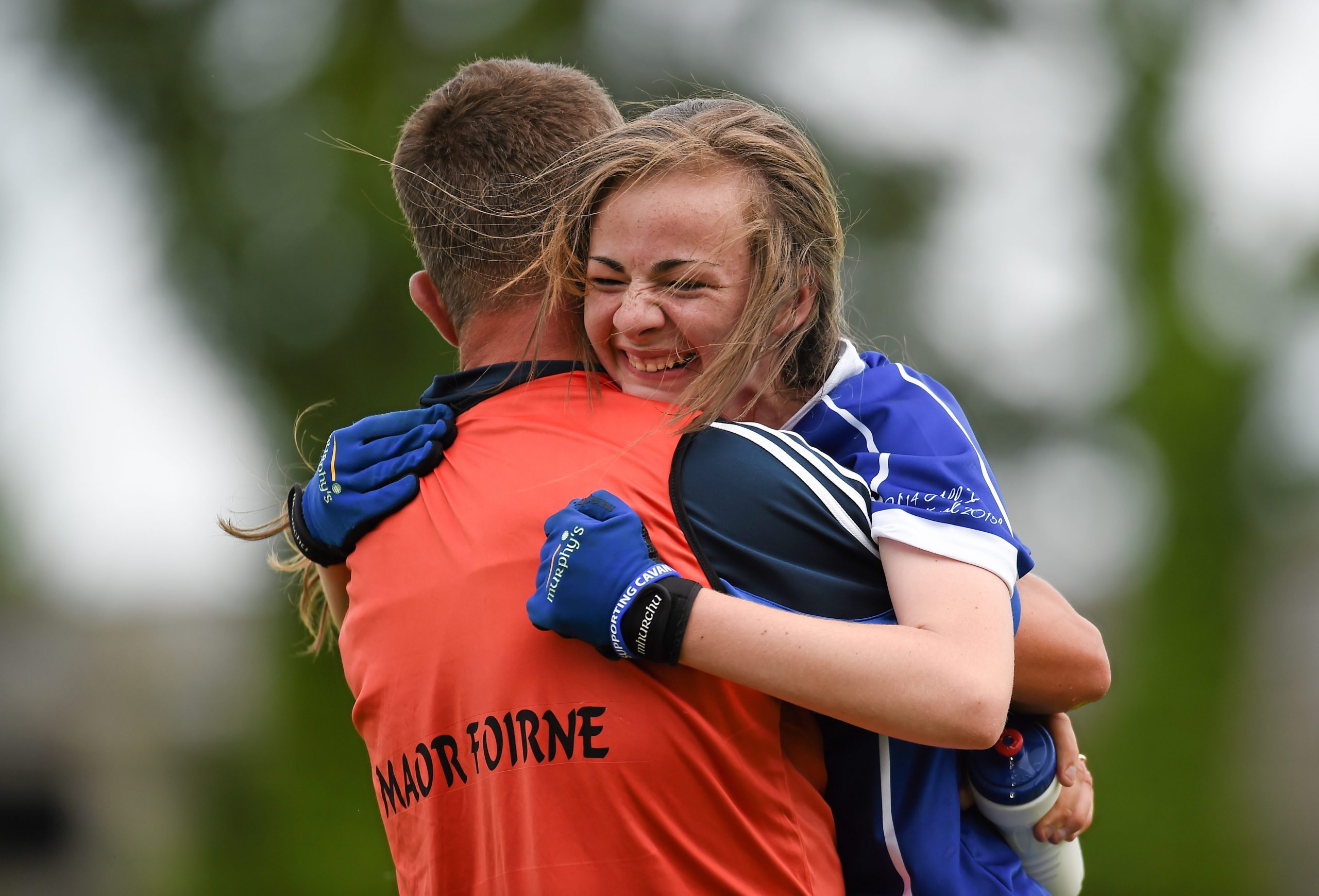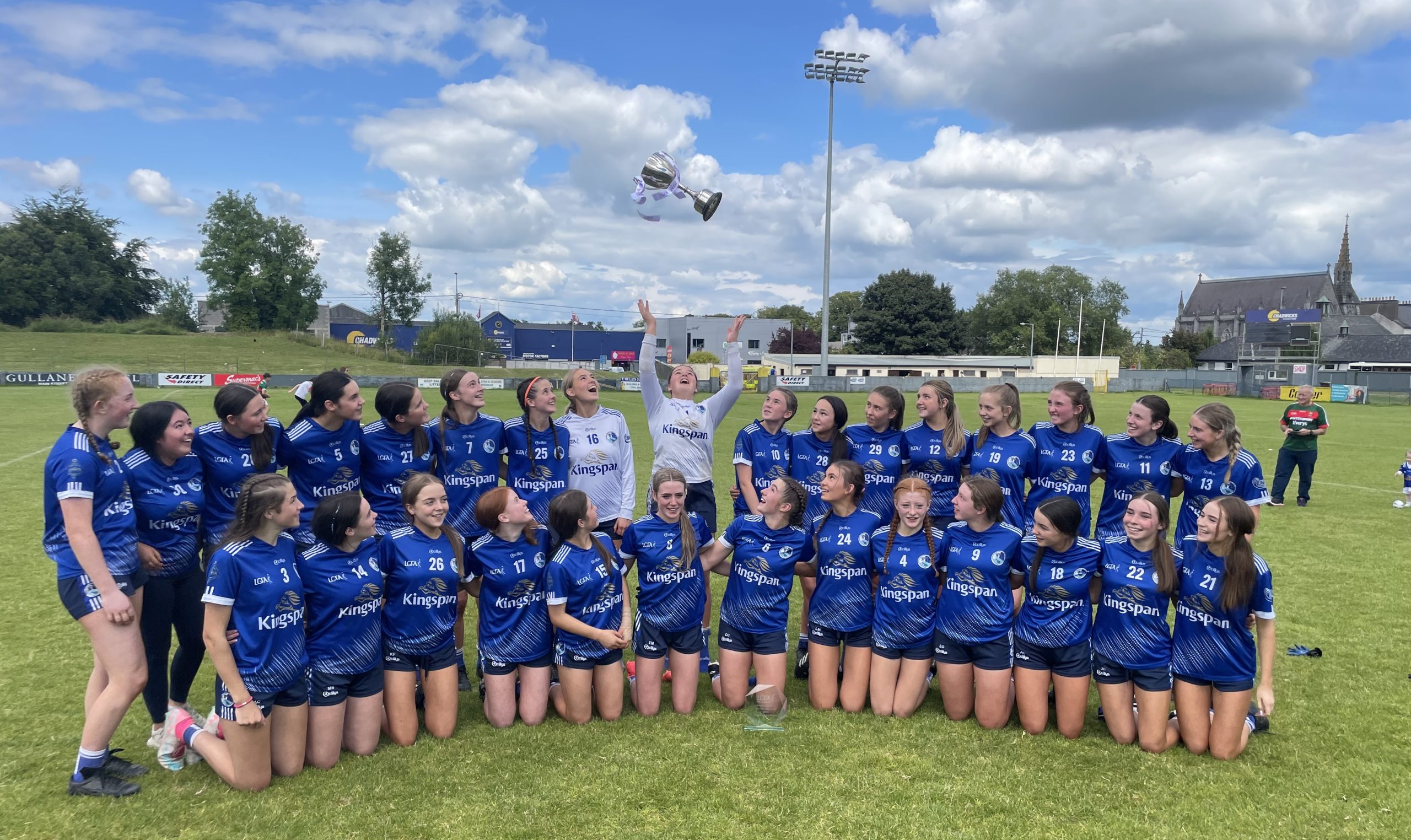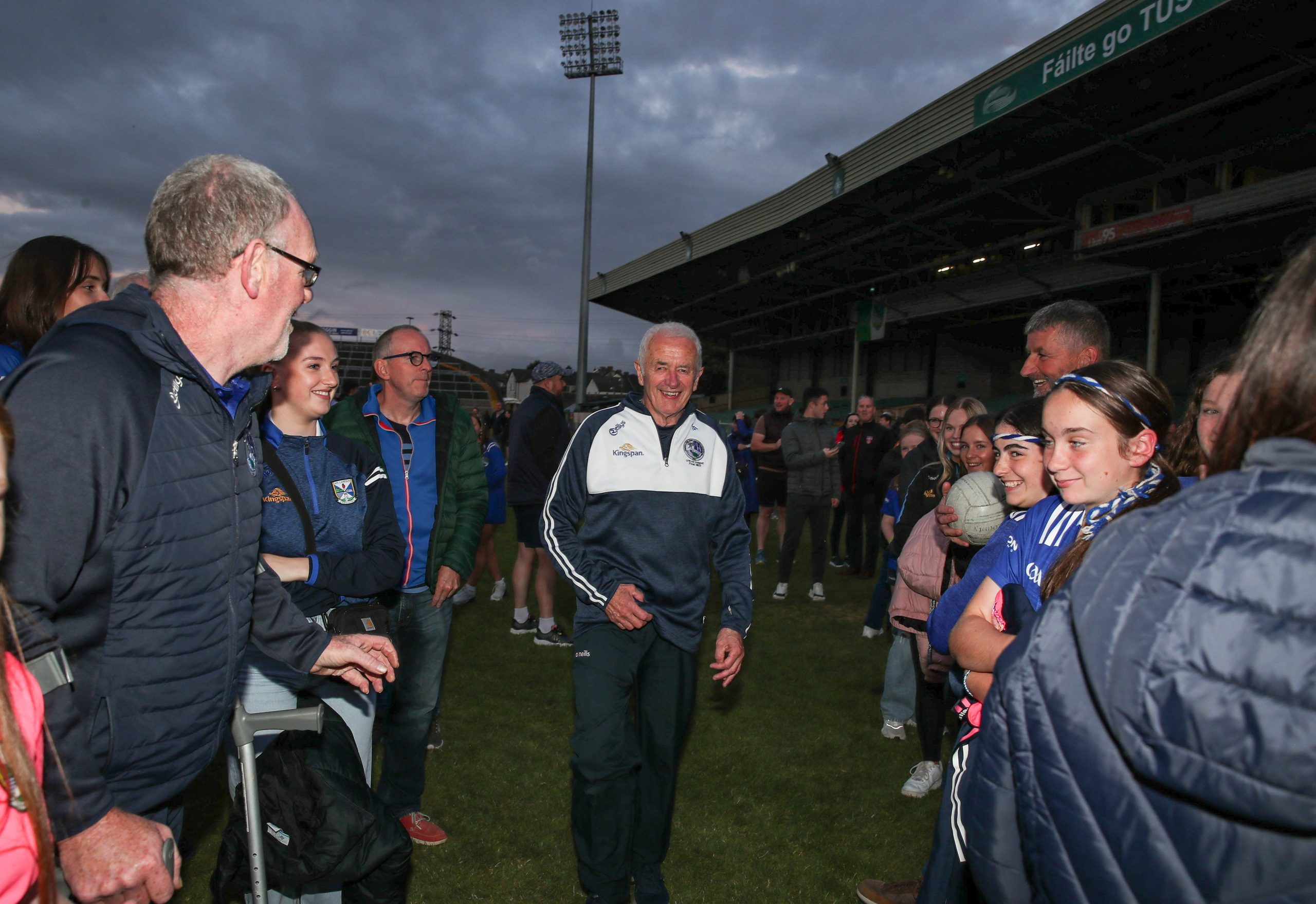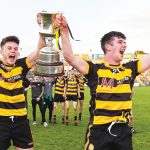Cavan were All-Ireland u-18 and u-16 champions this year and were narrowly edged out by Galway in the u-14 final. All finals were in the top division. It wasn’t always this way. Mick Flynn began the upward journey 15 years ago. He spoke with Michael McMullan…
WHEN the pupils of Cnoc Mhuire in Granard wanted to start a football team, there was only one place to start. Cavan man Mick Flynn.
Born and raised in GAA, his enthusiasm was brimming. When a knock came on the staffroom door, he answered in more ways than one.
Now retired, he has been a helping hand in the success story that is Loreto College in Cavan but the phone call he received in March 2009 cut the sod on a labour of love project that changed the Breffni ladies’ underage fortunes.
His success with Cnoc Mhuire alerted the Cavan ladies board to someone who could take over the county minor team.
There was one problem. The Ulster Championship was only two weeks away. A last-minute stop gap was the way they’d always done it but Mick Flynn politely declined.
“That was no way of doing things,” he said. There was a correct way and it wasn’t long before there was a proper chat with the board.
Teams need proper preparation to give themselves a chance. Flynn said he’d be interested in helping but the county needed a look in the mirror. What did they really want?
By August his phone was buzzing. Would be interested in getting involved at u-14 level with a development group? The answer was yes. Flynn gathered a management team and wheels were promptly put in motion to get a trial process in place.
Saturday mornings were pencilled in and clubs were asked to send any u-14s they had moved out of u-12s.
“I think maybe the first time there might have been 80 or 90 players,” Flynn said of the initial process.
“We had about eight helpers, so we broke them into groups up into eight and we had different stations.”
Every station was geared towards a skill. With smaller numbers, players got more touches and there was a better chance of both spotting and correcting mistakes. It helped coaches and players become familiar.
“Every kid was going to have a variety, eight different things before they got back to the beginning again,” Flynn said of their session structure.
In their first year they entered two teams in the All-Ireland, one in A and the other in B. While they didn’t take home any silverware, it let them see the level they needed to reach.
The following year, they entered one team in the B competition and went to work on the selection of a panel.
Part of their selection process was taking around 50 players to a blitz in Garvaghey where players got plenty of action. It was the next step in taking the skills from the training field to games against best of the rest of Ulster.

WE DID IT…Celebration time as Cavan beat Cork to win the 2015 u-14 All-Ireland
Cavan won the All-Ireland U-14 B with the hopes of moving up the top grade the following year only to be told they were staying in the second tier despite an appetite to challenge themselves.
“I’ll never forget the response I got,” said Flynn. Cavan weren’t good enough to mix it with Monaghan, Tyrone or Donegal.
“I didn’t argue. I just left it at that. There was no point in arguing at that time anyway because the decision had been made.”
After another year winning silverware at B level, Cavan moved up to A where they progressed before beating Monaghan in the final. Flynn flipped the question back. Were they good enough now?
With his trusted management team, Flynn came back every year with new players to develop. It was an upward curve until they won the 2015 All-Ireland, beating Cork in the final.
Three years after that, they were u-14 champions with victory over Dublin in the decider. After a four-year sabbatical, Flynn assembled his management team before applying for the u-16 job.
They were back for another year and yielded an All-Ireland A title after beating Cork in a replay.
“I had a group with me who were just excellent,” Flynn said of his management group.
“I knew these people personally and I knew that they were just top of the pile as people, as characters.
“There was honesty and that obviously transmits because I know from teaching that you can’t bluff because kids can see it.”
On the field, Flynn hailed the efforts of the players and the support they received from their families.
***
Flynn’s philosophy on football is simple with players learning the game. There are no shackles. It’s about expression. It a fear free zone.
“Believe it or not, we never asked them to win the game,” he admits.
The requirement is simple. Give your all. Nothing less than 100 per cent is accepted. After that, with the coaching in place, everything else takes care of itself.
Mistakes will happen. It’s inevitable. In Flynn’s book, errors and defeat don’t combine to mean failure. Failure is giving up. There is a marked difference.
“We gave some kind of coaching to the defence but very little to the forwards,” he added,
Players were advised where to run or questioned if a player didn’t pass to someone in space. That was as much as it entailed.
While some teams are overcoached into runs and patterns, Flynn’s Cavan teams had a blank canvas.
From his involvement with Loreto College, he noticed the patterns of play between players who operated together for Cavan u-16s. It was slick.
“The understanding was just uncanny,” Flynn said. “A lassie would make a run and she’d hold it for one more solo because she knew one of the forwards was going to turn and get in behind the defence.”
Another important factor was belief. From the early days of Cavan almost being inferior, there was confidence in the system. The work was done and with it came the adage of the more they practiced the luckier they got.
There was also a freshness of new players coming in every year. Some players would be there for two seasons. They knew how the camp ticked by the second year and could steer those coming up from u-12.
With players involved in other sports there were always plenty of irons in the fire.
In terms of Cavan underage football, it was a session during the week with another one on the weekend.
Most stuck with it while others came, dipped their toe in, before deciding it wasn’t for them.
Getting to the standard would take work but the regular success was an attraction. Success breeds success.
During that spell with Cavan, Flynn touched base with Tara Doonan to chat football to enquire if they’d a team competing at u-14 level at Ulster level.

UP IT GOES…Goalkeeper Fainche Higgins throws up and catches the cup after Cavan’s All-Ireland u-16 win
They had hoped to but it was dependent on staffing and help. Flynn, a retired teacher, offered to lend a hand. Bingo, it was a win-win situation for everyone.
At that point, Loreto weren’t operating at the top level but some joined up thinking with Flynn’s time and enthusiasm worked a treat.
There was a thought that St Louis, Monaghan would be on a different level but as the only all-girls school in Cavan, Loreto was the sleeping giant ready to be awakened.
“I remember playing St Louis, Monaghan with Cnoc Mhuire where we played them in an All-Ireland final,” Flynn recalls. “It was the year (1996) that Monaghan won the All-Ireland senior final, we played them in a school’s final.”
It was the era of Jenny Greenan when St Louis had a handful of senior county senior players on board.
“That was saying to me, we’re (Loreto) not very far away if we do the right things, we can compete” he added.
“Once Loreto got themselves organised, I think they have won something like 26 titles since.”
With the rise in the number of clubs, it all fed into genuine progress across the county.
Getting to three All-Ireland finals – and winning two – at Grade A highlights the rising tide. The game is popular and numbers are plentiful.
It all feeds back into the clubs with players exposed to playing their counterparts from across Ireland. The challenge now is to harness it to senior level, a debate for another day.
***
From a coaching point of view, Flynn highlights the importance of enthusiasm. For him, it just comes naturally.
With every word you soon appreciate how he can get his points across and in the world of underage, it’s about showing players the game and getting them to fall in love with it.
Once you have them, it’s important to have feedback that is concise and highlights both the good and the not so good. But it must be honest.
Flynn can remember being put in goals when he was starting out his underage career,
Three goals flew past before he was replaced at half-time. After the game, the coach gave him a pat on the back accompanied by the words “well done.” Flynn never forgot it.
“Even then, I was young enough to realise that it wasn’t well done,” he says, questioning why he was given false feedback.
“We underestimate people, we read them and an awful lot of the time we read them wrong.
“We should give them the credit they deserve but don’t give them the credit they don’t deserve it.”
It’s something he took into his own coaching. He can remember substituting a young girl during a game when she wasn’t having her best day.
Walking toward the sideline, her head was down. A natural enough reaction on reflection of a below par performance.
When she reached the sideline, Flynn called her over in his direction. Sheepishly, she approached.
“All I said was, I asked her if she remembers a catch she made in the middle of the pitch,” Flynn continues
“Immediately, her shoulders lifted up, her head looked up and she looked straight at me and said she did.”
In a moment when a young player was half expecting the aggressive, negative feedback often witnessed, she was thrown a nugget of positivity.
“She was told something good that she could not deny,” Flynn says to explain his point.
“It wasn’t a question of telling her she was the best in the country when she hadn’t done anything to warrant that.
“If you can say to a girl, she caught that ball above two other players and held on to it, she can’t deny that.”
At that moment on a sideline, it was enough to leave a player going home reflecting on both sides of a performance, something that can be explored at a training session.
“I am very conscious of the mentality of the youth,” Flynn said.
“I remember saying, even in teaching, nobody will ever remember what you taught them, but they will always remember how you made them feel.”
An hour spent chatting with Mick Flynn is refreshing and challenges how things are viewed.
You soon get a picture of the structures that have helped Cavan to a remarkable year at u-14, u-16 and u-18 level.
Participation levels are up and there is a pathway with a prominent school team to offer more games to help in the development process.
The girls who knocked the staffroom door in Cnoc Mhuire knew Mick Flynn had played football and could be their passport to a school team.
Now, everybody in Cavan and across the ladies’ football family knows his coaching credentials.
County football in Cavan is no longer an afterthought.
Now the question isn’t who they’ll get to look after a minor team with two weeks to the championship.
The question is more than that. Can Cavan become a force at senior? We’ll see. But, as the saying goes, a rising tide lifts all boats.
Receive quality journalism wherever you are, on any device. Keep up to date from the comfort of your own home with a digital subscription.
Any time | Any place | Anywhere















